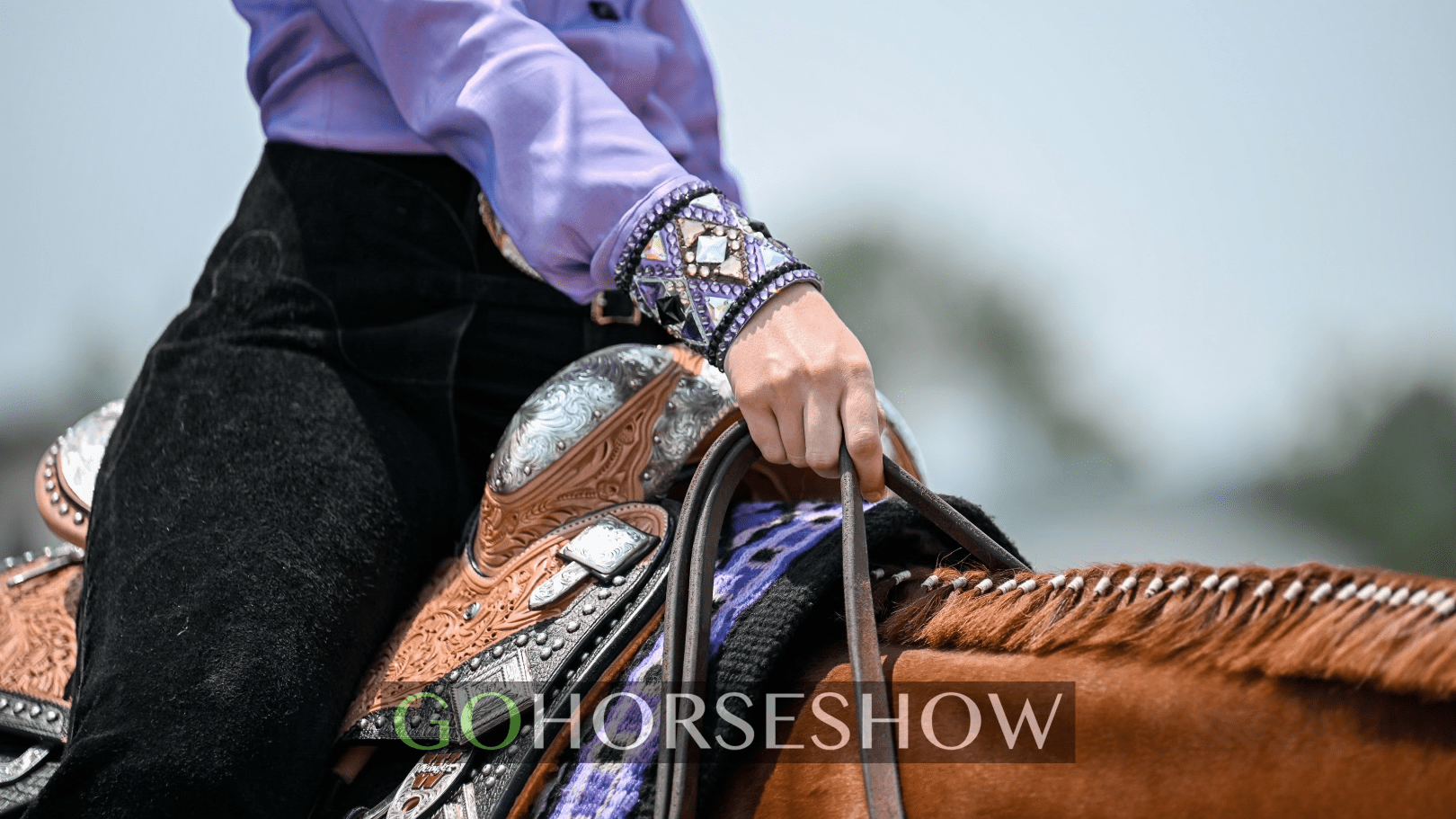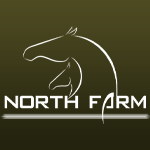Adrenaline is one thing, but horse show anxiety can cause more than just an increased heart rate. It can cause forgetfulness, dizziness, nausea, panic, and even difficulty breathing. This more extreme reaction to performing can have detrimental consequences beyond the exhibitor themselves.
Indeed, we are working with flight animals that can sense our anxieties and this can lead them to react negatively – causing a snowball effect on our performance as a team.
 We spoke with Meredith Brisson, LICSW, a mindset coach with a Master’s in Social Work who specializes in coaching equestrians, to get her insight for reducing horse show anxiety.
We spoke with Meredith Brisson, LICSW, a mindset coach with a Master’s in Social Work who specializes in coaching equestrians, to get her insight for reducing horse show anxiety.
Brisson herself is a lifelong equestrian, who began riding as a three-day eventer and then moved into dressage. She started her career as a social worker, helping clients deal with anxiety. She then decided to merge her two passions: anxiety coaching and horses, to specialize in equestrian sports psychology coaching. Her practice focuses on helping riders move past their fears to unlock their and their horses’ best potential.
“I found my niche in the industry when I realized that I was riding great horses with great trainers in big competitions, but I wasn’t having fun,” Brisson laments. “We put so much time, effort, and money into our sport that it often creates a huge amount of self-pressure. Many competitors go from loving horses to leaving the sport due to a dread of competition and all that comes with it. My goal is to help bring the fun back to equestrian competition by helping clients face and then minimize their anxieties.”
Find Your Anchor
One of the first things Brisson encourages her clients to do is “find their anchor.”
“I always begin the process by asking clients to explain why they compete with their horse.”
 Many people express a desire to win, and, of course, that tends to be the surface goal of many competitors. However, that is rarely the main thing people say they want to get out of showing. Instead, many people say their main reason for competing is to grow as a horseman, or to challenge themselves, or to show off an animal that means something to them.
Many people express a desire to win, and, of course, that tends to be the surface goal of many competitors. However, that is rarely the main thing people say they want to get out of showing. Instead, many people say their main reason for competing is to grow as a horseman, or to challenge themselves, or to show off an animal that means something to them.
“When people can tie their performance to a purpose/anchor, it is easier to frame the outcome in a positive light. If the purpose for competing is to improve and grow, then there will always be something to celebrate and be encouraged by that isn’t tied to an outcome you can’t control – like what the judges think.”
She continues, “Most peoples’ anxiety comes from worrying about things beyond their control. If you are able to define your own success in each class with process-oriented goals for that class, you will be able to put yourself more in control of the outcome, which ultimately reduces anxiety.”
Brisson says that, by holding on to your purpose and focusing on attaining specific, personal goals that advance that overall purpose, you cannot fail. “If the major goal is to win, you will likely fail more than you will succeed. This continuous failure will only increase show anxiety. If the process itself is a win, then you will never lose and that builds confidence.”
Breathwork and Meditation
Brisson believes that working through breathing meditations can be very helpful in allowing competitors to be present at the moment, which reduces anxiety.
 “Again, most anxieties stem from focusing on things you can’t control – things that happened in the past that cause you to be nervous or things you fear happening in the future,” Brisson explains. “But you can only impact what is happening right at this moment with you and your horse.”
“Again, most anxieties stem from focusing on things you can’t control – things that happened in the past that cause you to be nervous or things you fear happening in the future,” Brisson explains. “But you can only impact what is happening right at this moment with you and your horse.”
Meredith credits intentional presence at the moment as being a large part of her counseling. “I believe that connection is such an important part of our sport. If we really dig down to the heart of the issue, it’s about connecting to yourself, connecting to your horse, and connecting to the present moment. When we can do all of that during a class, we are better able to access skills and build skills. We are able to trust our horse and our training. And we are able to get to a state of flow where our practice and training comes to the surface and we can give our best performance.”
A popular method of breathing meditation is the 4-7-8 method. This involves sitting in a quiet place and putting all our focus on our breathing – breathing in for the count of four, holding the breath for the count of seven, and then exhaling for the count of eight. There are also guided meditations exhibitors can access for free on YouTube.
Visualization
Visualization and meditation often go hand in hand. Once your mind is quiet and you are focused, Brisson advises you to imagine a “realistic go” first, before visualizing the “perfect go” to help prepare your mind and body to perform your best.
 “Many people want to only visualize the perfect performance. While there are benefits to this, it is hard for many riders to trust perfection, as this almost never happens in the horse world… or in any sport for that matter,” Brisson chuckles.
“Many people want to only visualize the perfect performance. While there are benefits to this, it is hard for many riders to trust perfection, as this almost never happens in the horse world… or in any sport for that matter,” Brisson chuckles.
“Therefore, I find my clients do better by envisioning an attainable go – putting mental emphasis on areas that are likely to be more difficult so that you can imagine the best way to deal with them. In this way, you won’t panic when things become difficult in reality and your mind will move to problem-solving and addressing the issue more quickly.”
Brisson cautions, “You also don’t want to imagine the worst-case scenario because a self-fulfilling prophecy can be a real thing. Instead, imagine having some reasonable bobbles or struggles and working through them – the key is that your visualization must end positively where the overall go is great.”
She finds this practice helps riders build confidence and put mental energy into the difficult elements of a ride or pattern such that they can get back on track quickly when things may not go as planned. Once riders have practiced their “realistic go”, then she recommends ending with that ultra-positive “best-go” visualization to head into the ring on a high note.
Put Your Energy into Focus
Perhaps one of the worst things we can tell ourselves and each other when we are dealing with anxiety is to “relax.” Indeed, the more we worry about trying not to worry… the more we just amplify our worries. It’s a vicious cycle.
Brisson explains, “Relaxing is more of an ‘inaction,’ which is hard for our brain to wrap around when we are anxious or amped up. Instead, train your brain to turn that nervous energy into focused energy. Instead of freaking out over freaking out, tell your brain to quiet down and think about something that will help you in your go: focus on that transition, focus on your body positioning, focus on pattern flow, etc.”
“When competitors can put nervous energy into something to move toward instead of something to run from, they will find that their brain becomes engaged in a productive way and the anxiety will dissipate to an extent.”
Nobody Is Hoping for You to Fail
As previously discussed, anxiety is often about a lack of control. You can only control your own thoughts, preparation, and performance. However, Brisson finds, “Our brains often hijack us and create stories about what others are thinking and seeing, which can put us in a negative headspace where we envision failure instead of success.”
“I tell my clients to stay in their lane. Stick to thinking about what you can control in your performance and be intentional about telling yourself it’s not helpful to think about what other people are thinking. When you notice yourself dwelling on your perception of other opinions, remember that is just a thought and not the truth. You are in control of the thoughts you allow to manifest and stick around.”
Meredith believes that concerns about others actually can be useful for helping us manage anxiety and create a community that encourages support and camaraderie. “Be the competitor who says a word of encouragement to another person, or who shares a smile. Often times people will match your energy. If you support others, you will find others supporting you. And when you feel like people are in your corner, it reduces stress and anxiety. If you consciously spread positivity, I do believe it will return to you.”
Medications and Alcohol
Many exhibitors have turned to some form of medication to cope with anxiety – whether it be prescription medication or self-medication through alcohol.
She says that there are absolutely situations where people benefit from being on medication in order to cope with severe and ongoing anxiety and that is a decision to be made with the consult of a physician. She strongly discourages exhibitors from self-medicating and sharing medications with friends to help them cope as there are side effects and dosage issues that are unique to each person. This is a doctor-patient, individual issue.
Brisson believes, “If medications have been prescribed by a doctor and they are allowing you to connect better to yourself and your horse, then they can be very helpful. But if the intent of taking the medication is to numb yourself to avoid the discomfort of horse show nerves, then you are actually bringing yourself into a state of disconnection, which can be detrimental to your performance.”
Meredith finds that alcohol tends to create more disconnection for exhibitors than connection. “While alcohol may relax you, you need to be present and ‘on’ while riding. You need to be aware and able to notice what is happening with your horse and your surroundings. Alcohol can really impede that.”
“While you may have a short-term gain by drinking that cocktail before a go because it will likely take the edge off, it is unlikely to aid in having you show up as your best self, and the long-term impact of continuous use is that it becomes a crutch. Instead of learning to rely on yourself and trust your horse and your training, you begin to rely on the crutch to get by, which doesn’t actually teach you to deal with the anxiety, it simply masks it.”
***
Brisson concludes, “If you find yourself experiencing anxiety at a show, ask yourself the ‘Million-Dollar Question:’ What do I need to do to make _(insert desired, controllable outcome)_ happen? This will help you to have a solution/action-focused mindset when all else fails.”
“Remember why you compete. Remember your training. And redirect your brain to action in the moment instead of focusing on things you can’t control. We all experience anxiety…and learning to deal with it and channel that adrenaline into focused energy is a real win!”









